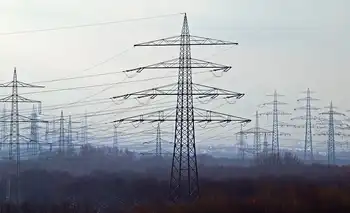Leaked Tory enviro plan promises dramatic cuts
OTTAWA, CANADA - The government promises to ban inefficient light bulbs, cut greenhouse gas emissions by 20 per cent and dramatically reduce air pollution as part of a national environmental initative.
Details of the long-awaited plan unexpectedly became public late April 24 after a speech Environment Minister John Baird intended to deliver later in the week was faxed by mistake to the opposition Liberals.
The blueprint, dubbed the Turning the Corner plan, includes various measures to stop the rise of greenhouse gases in three to five years. "The previous government was never able to put on the brakes," the speech says. "We will do that beginning today."
Once halted, the government plans to reduce greenhouse gases, so that by 2020, Canada will have cut them by 150 million tonnes. That represents 20 per cent of current emissions.
The government also plans to impose targets on industry so that air pollution is slashed in half by 2015.
To reduce greenhouse gases, the government plans to impose “strict targets" for industry. Firms will be able to make in-house reductions, take advantage of domestic emissions trading, purchase offsets, use the Clean Development Mechanism under the Kyoto Protocol, and invest in a technology fund.
In addition to exploring domestic trading, the government will look at future linkages with emissions trading systems in the U.S. and possibly Mexico.
That represents something of a change from Conservative policy. Harper and Baird have repeatedly brushed aside requests to take part in any international trading of emissions credits.
Companies who reduced their greenhouse gas emissions prior to 2006 will also be rewarded with a one-time credit for early action.
Baird's remarks also say the government will announce a ban on conventional incandescent light bulbs as well.
All this left the Conservatives dealing with an embarrassing breach in secrecy after the Liberals said the showcase section of their environmental plan was faxed to them in the House of Commons.
The Liberals summoned reporters to their parliamentary offices on short notice late in the day April 24 to announce what they said was the leak, but refused to release details from the government speech.
Under pressure to explain, the government divulged the text. A government official initially insisted it contained no revelations. But a cursory reading of the speech made it clear there were several previously unannounced measures in the remarks.
Harper and Baird traveled to Thornhill, Ont., to announce new limits on heavy polluters.
The premature release of the plan capped a bizarre evening of claims and counter-claims that put a dent in the young government's reputation for discipline.
Liberal MP David McGuinty said he received the speech from a House of Commons page who retrieved it from the opposition's fax machine April 24.
A second fax soon arrived warning that release of the information would constitute a possible breach of security laws.
"You are in possession of confidential government information that was faxed to you in error in the last hour," the second document said.
"You are asked to disregard its contents. Any sharing, reproduction or distribution of this material or its contents is strictly prohibited. The premature release of this information could constitute an offence under applicable securities or other legislation."
That fax was followed up by a visit from the sergeant-at-arms and Commons security officers demanding the return of the speech.
Any number of others may have received the fax, McGuinty said. He called on the government to release the contents of its plan before markets opened April 25 in case traders learned of the details and acted on the information.
A government official accused McGuinty of shameless grandstanding.
The contents were intended to be made public on April 25, before the official announcement the next day so there is "nothing in it that affects the markets," the official said.
"There's not a single target in there."
But that didn't appear to square with the contents of the speech, which included the announcement of several new measures.
McGuinty wasn't convinced by the government's explanation. In a later interview, he said the speech he received included “considerable detail" about the government's emission reduction plan.
"There are percentages, there are predicted cuts, there are all kinds of things in this document that could lead one to conclude that there could be some risk in this."
There is a rich and recent history of leaks having a profound effect on federal politics.
Accusations that the Liberals leaked changes to income trust regulations led to the RCMP taking the unprecedented step of confirming they were undertaking a criminal investigation into the matter – in the middle of the 2005-2006 election campaign.
A Liberal lead in that campaign instantly evaporated and the Conservatives went on to win their first mandate in almost two decades. A senior Finance Department bureaucrat was eventually charged with profiting from the leak and the Liberals were exonerated.
The breach brought to mind another sensational leak that set Ottawa abuzz.
In May 1989, Global TV reporter Doug Small and four other people were charged with possession of stolen goods, and two were charged with theft, in connection with the leak of the previous month's federal budget.
Small was given details of the budget the night before its release. His scoop forced then-Conservative finance minister Michael Wilson to deliver his budget speech that evening within two hours of Small's report going to air.
Related News

New England Is Burning the Most Oil for Electricity Since 2018
BOSTON - New England is relying on oil-fired generators for the most electricity since 2018 as a frigid blast boosts demand for power and natural gas prices soar.
Oil generators were producing more than 4,200 megawatts early Thursday, accounting for about a quarter of the grid’s power supply, according to ISO New England. That was the most since Jan. 6, 2018, when oil plants produced as much as 6.4 gigawatts, or 32% of the grid’s output, said Wood Mackenzie analyst Margaret Cashman.
Oil is typically used only when demand spikes, because of higher costs and emissions concerns. Consumption has been consistently…




